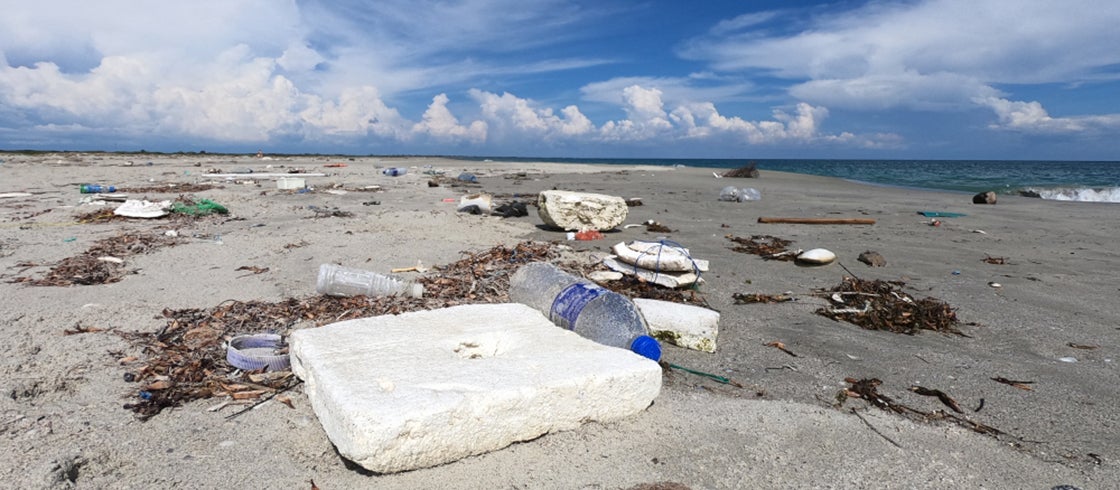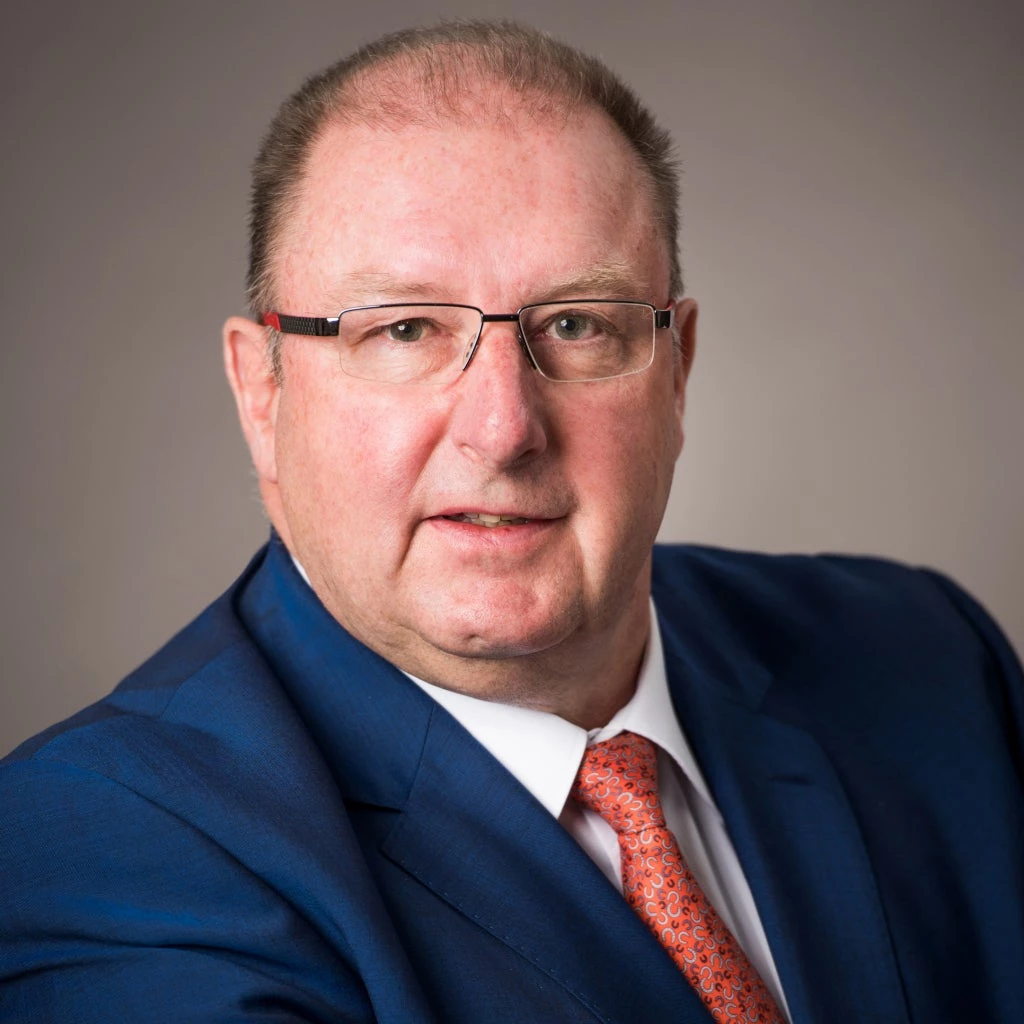 Plastic pollution on beach, Talaimannar, Sri Lanka. Photo: Petr Sejkora/Shutterstock.com
Plastic pollution on beach, Talaimannar, Sri Lanka. Photo: Petr Sejkora/Shutterstock.com
The stunning archipelago of Maldives is a symbol of the ocean. However, resident Shaahina Ali laments, “My grandkids may not see any whales in their lifetime.” Plastic waste is endangering marine life and withering the ocean that surrounds this island nation.
Ali, who is director of Parley Maldives, is not giving up. With Parley for the Oceans, Maldives is upcycling plastic waste into high-quality products such as sneakers and football jerseys, much like its Caribbean counterpart, the Dominican Republic, which is turning discarded plastic into personal protective equipment (PPE) for frontline workers. Who would have thought that plastic bottles can be turned into a football jersey for Manchester City or into a PPE face shield to help save lives?
Innovative solutions such as these are much needed as South Asia battles a devastating new wave of the COVID-19 pandemic. Along with human tragedy, the pandemic is also contributing to greater environmental damage through a surge in the use and improper disposal of plastic waste.
This spirit of innovation and commitment to converting plastic waste into value ran high among Ali and other experts at our recent virtual #OneSouthAsia event: Turning the Tide on Marine Plastics in South Asia. The region is the world’s second largest contributor of solid waste —334 million tons annually. Sadly, the region is also on track to be the fastest growing contributor to plastic pollution over the next two decades. About 70 to 80 percent of this waste travels into rivers and oceans, and about 12 percent is plastic . Discarded plastic, some barely the size of a sesame seed, threatens livelihoods and human health.
South Asia is the world’s second largest contributor of solid waste —334 million tons annually-- and is on track to be the fastest growing contributor to plastic pollution over the next two decades
“When humans are faced with adversity, there is an opportunity to make change,” Prasad Kariyawasam, a former Foreign Secretary of the Government of Sri Lanka, reminded us. This island country, faced with plummeting fish stocks from marine pollution, launched Surakimu Ganga, a national initiative to clean all of its 103 rivers.
However, Kariyawasam recognized that the whole is greater than the sum of its parts. He boldly called for developing a regional code of conduct to curb plastics pollution in South Asia, given the ubiquitous, transboundary nature of marine plastics. The call is a timely one. A recent National Geographic Society experiment dropped a plastic bottle with a GPS tracker into the Ganges River and found the bottle traveled 1,700 miles — roughly the distance from Islamabad to Colombo – in just 94 days.
The spirit of regional cooperation on environmental issues is not new to South Asia. Ambassador M. Ashraf Haidari, Afghanistan’s chief diplomat in Sri Lanka, said the South Asia Cooperative Environment Program (SACEP) was created in 1981 as an inter-governmental organization to protect the environment across eight South Asian countries. Haidari also serves as director of SACEP.
South Asia adopted a roadmap in 2019 that sets a policy framework for achieving sustainable waste and resource management as well as one to address marine plastic pollution. A first of its kind regional project, Plastics Free Rivers and Seas for South Asia, a $50 million program launched by the World Bank, SACEP, and Parley for the Oceans, is facilitating the region’s transition to a circular plastic economy. The program focuses on identifying, financing, and scaling innovative solutions and regulatory policies to address plastic pollution.
While there is no magic fix to clear South Asian waters of plastic clutter, the panelists agreed an “all hands on deck” regional approach is needed to bring together advocacy, public education, corporate responsibility, and policy making. Panelists suggested several approaches to curb plastic pollution:
- Act now on COVID-19 plastic waste: Asia is projected to throw away as many as 1.8 billion face masks daily, further exacerbating global marine plastics pollution. Governments should immediately start encouraging reusable and biodegradable PPE via mainstream media, Kariyawasam said.
- Tap into the passion of citizens: Ali said Maldives Parley is using social media to change consumer behavior and encourage corporate innovation. The messages advocate what Parley calls an “AIR” approach to avoid, intercept, and redesign plastics.
- Catch them young: Ambassador Haidari suggested that environmental issues be added to the school curriculum for grades 1-11 so youth understand the challenge of plastic pollution. This is a key part of public education to fight marine plastics pollution.
- Form partnerships: Shamima Akhter, head of corporate affairs for Unilever Bangladesh, said the company’s brand power can help educate the public about plastics and encourage them to adopt new practices. “If LUX (a best-selling brand of soap and shampoo) says we will consume less plastics, people will listen,” Akhter said. She added that Unilever is committed to working with other stakeholders – governments, civil societies, suppliers and communities – as change requires the participation of all.
While there is no magic fix, an “all hands on deck” regional approach is needed to bring together advocacy, public education, corporate responsibility, and policy making
- Limit plastic packaging through policy: There’s no compelling reason for new toys to be packaged in plastics, Ali said. Globally and regionally, manufacturing policies should reflect efforts to transition to a circular economy for plastics with innovative business models, materials, designs, and reprocessing, and no leakage of plastic waste into the environment. Kariyawasam recommended incentives for industry to adopt alternative packaging so innovators won’t lose out to cheaper competitors.
- Plastic alternatives are needed now: “Recycling is not a solution, it is a Band-Aid and we need to redesign our material now,” Ali said. Sri Lanka has banned the manufacture or import of non-biodegradable plastic used for wrapping food and shopping bags since 2017.
Plastics pollution is a complex and transboundary issue that requires a coordinated regional approach. Both businesses and consumers need to change behavior when it comes to plastic. By working together, South Asian nations can create a sea change to #BeatPlasticPollution.




Join the Conversation